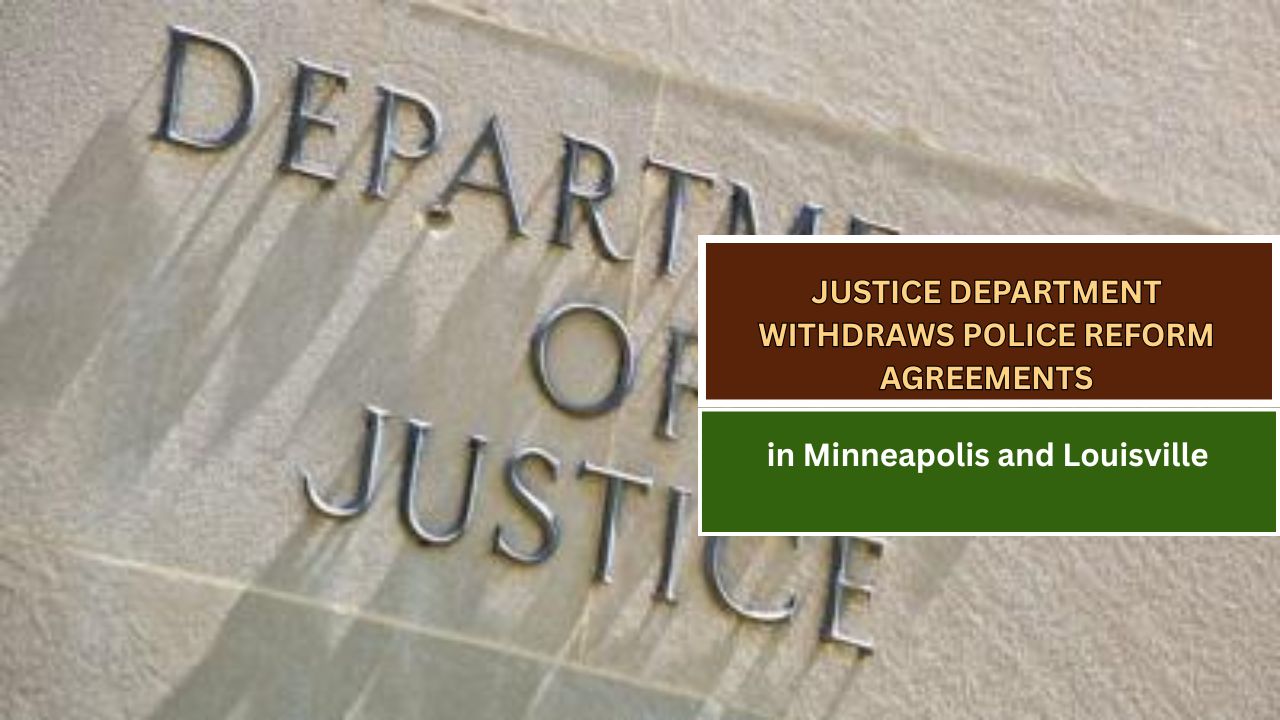The Justice Department on Wednesday took steps to cancel federal settlements with the Minneapolis and Louisville police departments that were set in motion following the 2020 deaths of George Floyd and Breonna Taylor. These reforms had aimed to overhaul local law enforcement practices that sparked national outrage and racial justice protests.
In a sweeping shift in policy, the Trump administration also announced it would rescind findings from Justice Department investigations into six other police departments that had been accused of civil rights violations under the Biden administration.
This marks a major departure from the Justice Department’s prior stance under President Joe Biden, whose administration aggressively pursued federal oversight of local police accused of misconduct. The Trump administration argued that past officials relied on legally unsound theories and imposed burdensome consent decrees that should instead be handled locally.
“It’s our view at the Department of Justice Civil Rights Division under the Trump administration that federal micromanagement of local police should be a rare exception, and not the norm,” said Harmeet Dhillon, Assistant Attorney General and newly appointed chief of the Civil Rights Division.
The announcement came just ahead of the five-year anniversary of George Floyd’s killing. On May 25, 2020, former Minneapolis police officer Derek Chauvin pressed his knee into Floyd’s neck for over nine minutes. The incident, captured on video, ignited protests worldwide and a renewed demand for police reform.
Under Biden, the Justice Department launched several “pattern-or-practice” investigations into police forces across the country, uncovering patterns of excessive force and racial discrimination. Consent decrees were reached with Minneapolis and Louisville just before the end of Biden’s term, but neither had yet received final judicial approval.
Police reform advocates sharply criticized the move to abandon these agreements, warning that removing federal oversight could endanger vulnerable communities.
“This move isn’t just a policy reversal. It’s a moral retreat that sends a chilling message that accountability is optional when it comes to Black and Brown victims,” said Rev. Al Sharpton, who worked closely with the families of Floyd and Taylor. “Trump’s decision to dismiss these lawsuits with prejudice solidifies a dangerous political precedent that police departments are above scrutiny, even when they’ve clearly demonstrated a failure to protect the communities they’re sworn to serve.”
Kristen Clarke, who led the Civil Rights Division under Biden, defended the investigations, saying they were driven by data, footage, and input from officers.
“To wholesale ignore and disregard these systemic violations, laid bare in well-documented and detailed public reports, shows patent disregard for our federal civil rights and the Constitution,” Clarke said in a statement.
The Trump administration is also reviewing more than a dozen consent decrees currently in effect across the country. Rolling back finalized settlements would require judicial approval and could face pushback from local communities still committed to reform.
Dhillon argued that federal consent decrees impose excessive costs and inefficiencies on communities. She pointed to local reform efforts already underway in both Louisville and Minneapolis.
“There is a lack of accountability. There is a lack of local control. And there is an industry here that is, I think, ripping off the taxpayers and making citizens less safe,” she said.
Minneapolis officials said they would continue to honor their federal agreement despite the DOJ’s withdrawal. The city also remains under a separate consent decree with the Minnesota Human Rights Department.
“We will comply with every sentence of every paragraph of the 169-page consent decree that we signed this year,” said Minneapolis Mayor Jacob Frey. “We will make sure that we are moving forward with every sentence of every paragraph of both the settlement around the Minnesota Department of Human Rights, as well as the consent decree.”
In Louisville, officials also pledged to stay the course on reform. The city had entered into a consent decree after a federal probe revealed widespread civil rights violations and racial discrimination by the Louisville Metro Police Department.
“We remain committed to reforming our police force,” said Mayor Craig Greenberg, adding that the city is actively seeking candidates to serve as independent monitors.
Louisville Police Chief Paul Humphrey emphasized that real change comes from ongoing efforts, not just legal documents.
“Throughout all of that process, we never hesitated, we never delayed, we never took a step back in trying to learn how to do our jobs better and serve the community better,” Humphrey said. “It’s not about these words on this paper, it’s about the work that the men and women of LMPD, the men and women of metro government and the community will do together in order to make us a safer, better place.”
This article has been carefully fact-checked by our editorial team to ensure accuracy and eliminate any misleading information. We are committed to maintaining the highest standards of integrity in our content.

Outside of work, he enjoys playing chess, following cricket, and writing short stories. His commitment to integrity and in-depth analysis strengthens OTE News’ mission of providing trustworthy journalism.



